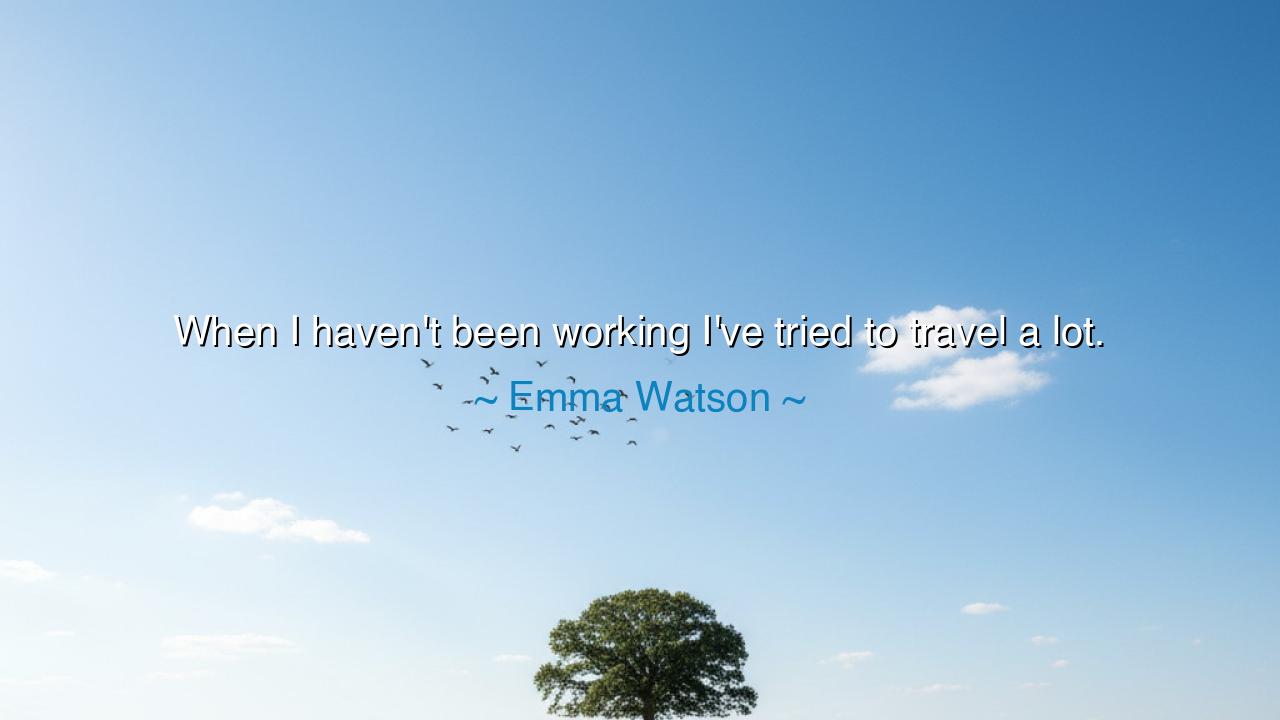
When I haven't been working I've tried to travel a lot.






The words of Emma Watson, “When I haven’t been working I’ve tried to travel a lot,” carry the quiet weight of an ancient truth. To the unmindful ear, they may sound like the passing remark of one who has known both labor and leisure. Yet if we listen with the ears of the soul, we hear in them the eternal rhythm of toil and release, of the furrow and the open sky, of the ceaseless striving of mankind tempered by the need to wander, to witness, and to breathe beneath the vastness of the world. For work is the forge of survival, but travel is the forge of spirit.
In the old days, the ancients knew this well. The farmer sowed his field in season, but when the harvest was gathered and the soil slept, he too would walk roads unknown, seeking markets in distant towns or festivals where strangers became kin. The warriors, when no war pressed upon their shields, would journey to foreign lands, not only to measure the strength of others but to taste new waters, to hear new songs, to feel the vastness of the earth their swords had sought to defend. Emma’s words echo this timeless balance: when one hand releases the tools of labor, the other hand yearns to reach across the horizon.
Consider the tale of Herodotus, called the Father of History. Though his life was not bound by the clock of the factory nor the contract of the stage, still he knew the burden of endless work: the work of chronicling the deeds of men. Yet when his quill grew heavy, he sought the road. He traveled among the Persians, the Egyptians, the Scythians, not because duty demanded it but because the spirit hungered. His writings breathe with the life of those journeys. Without them, his work would be sterile. His travels nourished his labor, just as the river nourishes the field.
So too, in Emma’s confession, there is not mere indulgence. It is wisdom. She reveals that one must seek renewal beyond the walls of labor. To travel is to let the heart expand, to allow the soul to become porous, drinking in strange tongues, unfamiliar faces, new suns rising above unfamiliar seas. The world becomes a scroll upon which the heavens themselves inscribe their wisdom. She teaches us: without such journeys, work becomes a cage. With them, work becomes a bridge.
Think also of Odysseus, who after the labors of war at Troy wandered the seas for ten long years. His journey was not leisure; it was trial, discovery, revelation. Yet in those wanderings, he came to know the sweetness of home, the strength of longing, and the wisdom of patience. His tale reminds us: travel is not escape, but education. It shapes the mind so that the return to labor is done with clearer eyes and fuller heart.
The lesson is plain: Man must not chain himself to the wheel of endless labor. Neither must he drown in ceaseless wandering. The secret lies in harmony. To work with vigor, and when the work is done, to travel—not always to distant continents, but sometimes simply to the neighboring village, to the mountain path, to the forest glade. For in the act of leaving the familiar, one rediscovers the wonder that first called them to labor.
Therefore, beloved reader, let these words guide you. Do not squander your hours only in toil, nor waste them only in escape. When your duty has been met, seek new lands, even if they lie only a few steps beyond your gate. Let your eyes rest upon a new horizon, let your feet learn the rhythm of unfamiliar roads. From each journey, return with a heart tempered like iron in water—stronger, wiser, gentler.
And so, the teaching endures: Work so that you may live, but travel so that you may understand. If you would live as one truly awake, balance the hammer with the horizon, and let your life be both labor and journey. This is the wisdom Emma’s words conceal, and this is the path that leads to a life not only endured, but exalted.






AAdministratorAdministrator
Welcome, honored guests. Please leave a comment, we will respond soon